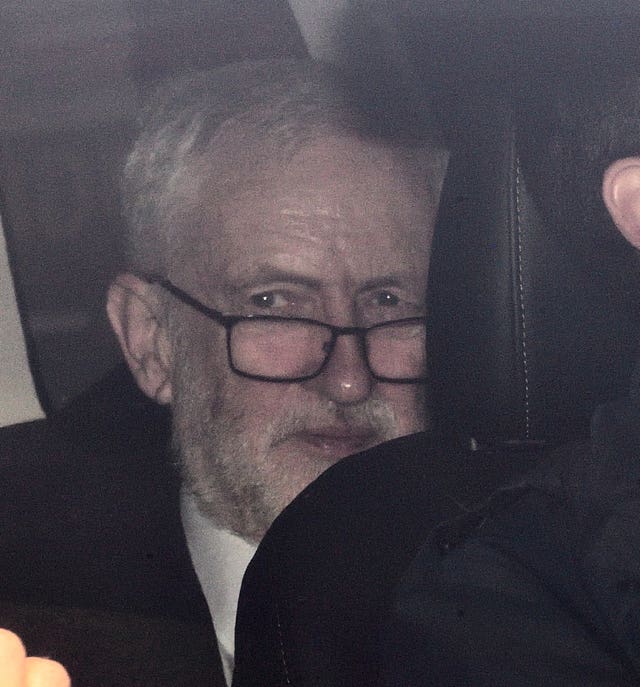Boris Johnson will vote for Prime Minister’s EU Withdrawal Agreement
MPs are debating Theresa May’s deal on the day when Brexit was once scheduled to happen.

Brexit figurehead Boris Johnson has confirmed he will vote for Theresa May’s EU Withdrawal Agreement in a special sitting of the House of Commons on the day the UK was scheduled to leave the European Union.
Mr Johnson said he had taken the “painful” decision to back a deal he once claimed would leave the UK as a “vassal state” because defeat for the Prime Minister would risk “an even worse version of Brexit or losing Brexit altogether”.
The move boosts Mrs May’s chances of securing a majority in the Commons for the Withdrawal Agreement which she struck with the remaining 27 EU states last November.
But she still faces an uphill struggle as key Government allies the DUP joined Labour leader Jeremy Corbyn in saying they would vote against the move.
In a special sitting of the Commons, MPs are debating the legally binding treaty segment of the Prime Minister’s Brexit deal, but not the accompanying Political Declaration setting out plans for the future EU/UK relationship.
The PM’s decision to split the two parts of the package means it does not qualify as a third attempt to pass a “meaningful vote” on the Government’s Brexit deal.
Under the terms of an agreement with Brussels, if passed by MPs on Friday the vote would qualify the UK to be granted an automatic delay to May 22 of the formal date of Brexit.
There were signs that Mrs May’s gambit has succeeded in winning over some of the Conservative rebels who voted against her deal in “meaningful votes” when it went down to defeat by a margin of 230 in January and 149 in March.

Ex-party leader Iain Duncan Smith, former chief whip Mark Harper and European Research Group members Lucy Allan and Daniel Kawczynski were among Eurosceptic backbenchers announcing they would vote with the Government.
ERG chairman Jacob Rees-Mogg said he would “reluctantly” back it, despite previously saying he would vote with the DUP.
Mr Johnson said he remained “intensely critical” of the deal.
But he added: “I have come to the sad conclusion that neither this Government nor this Parliament is willing to leave with no deal. We therefore run the risk of being forced to accept an even worse version of Brexit or losing Brexit altogether.
“A bad deal that we have a chance to improve in the next stage of negotiations must be better than those alternatives.
“It is very painful to vote for this deal. But I hope we can now work together to remedy its defects, avoid the backstop trap and strive to deliver the Brexit people voted for.”
Other Tory rebels indicated they were standing firm.
ERG vice-chairman Steve Baker said he could not “choke down” his opposition to the agreement so long as its backstop provisions for the Irish border represented “an indefinite threat to the Union and our self-government”.
Veteran Eurosceptic Sir Bill Cash told the BBC: “The Prime Minister’s deal is not Brexit.”
And former minister Owen Paterson wrote in the Daily Telegraph that to avoid “catastrophic damage” to their party, Tory MPs must “stand up for the 17.4 million people who voted Leave, firmly resolved to deliver Brexit in full on April 12”.
In a graphic illustration of apparent despair within the Government at Mrs May’s chances, BBC Newsnight political editor Nicholas Watt said that, when he asked one Cabinet minister why the PM had called Friday’s vote, he received the reply: “F*** knows, I’m past caring, it’s like the living dead in here.”
The vote comes on the day that pro-Brexit protesters – including a group who have taken part in a two-week march from Sunderland – are set to gather outside Parliament to mark the date when the UK was due to leave the EU.

The prospect of rebellion by a hardcore of Tory Brexiteers left Mrs May dependent on the votes of Leave-backing Labour MPs for any chance of securing her Agreement.
In an apparent bid to woo them, Attorney General Geoffrey Cox told the Commons that the Government would have backed an amendment from Labour’s Gareth Snell, giving Parliament the right to set the negotiating mandate for talks on future relations with the EU.
The amendment was not selected for debate by Mr Bercow, who also rejected SNP amendments calling for Brexit to be halted or made dependent on the approval of the Scottish Parliament or Welsh Assembly.
Opening debate in the Commons, Mr Cox said: “The House can take a single, decisive step today to afford certainty to the millions of people around this country awaiting it, to have a short extension – not prolonged – that will bring our exit from the EU to May 22.
“There will be no further uncertainty. The Political Declaration can be resolved in that time and the ratification of the bill can proceed, with any amendments that might be forthcoming in connection with the subsequent negotiating stage.

“What we have before us today is the legal right to extend. No other extension is guaranteed. Every other extension would require European parliamentary elections.
“We therefore are at an important crossroads for the purposes of this nation’s future and its history and I urge all members of this House to embrace this opportunity now.”
Shadow Brexit secretary Sir Keir Starmer insisted Labour will not back the agreement in the vote expected at around 2.30pm.
He told BBC Radio 4’s Today programme: “Not only is uncoupling the Political Declaration making Brexit more blind because you don’t know where you are going, now the Prime Minister has said she is stepping down.
“So the Political Declaration, the future relationship, is going now to be determined in a Tory leadership exercise. Even if this Prime Minister gave us assurances about what she’s going to do in the future, they don’t mean anything any more.”
But Cabinet minister Liam Fox warned that voters will feel “betrayed” if MPs do not pass the agreement, opening a “chasm of distrust” between voters and the political system.
If the motion on the Withdrawal Agreement is rejected by MPs, the UK will have until April 12 to ask for a further extension to Brexit negotiations – which would require voters to choose new MEPs – or leave the EU without a deal.





